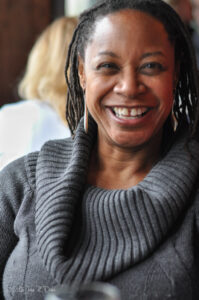The University of Michigan Woman of Color in the Academy Project is pleased to present its 6th Annual Shirley Verrett Award to professor  on Feb. 8, 2017, at 5 p.m. at Stamps Auditorium on U-M’s North Campus. A reception will immediately follow in the lobby.
on Feb. 8, 2017, at 5 p.m. at Stamps Auditorium on U-M’s North Campus. A reception will immediately follow in the lobby.
Gonzalez heads the Global Theatre and Ethnic Studies minor in the School of Music, Theatre & Dance and LS&A. The goal of the minor is to introduce students to literature and performance histories of diverse cultures, and to use studio practice to create new work from a diverse cultural perspective. Her research and publication interests are in the fields of ethnic performance, 19th-century theater, maritime performance, and the way in which performance reveals histories and identities in the Americas and in transnational contexts.
This event is free and open to the public. Non-ticketed registration is requested at http://tinyurl.com/ShirleyVerrett2017. The Shirley Verrett Award was created in 2011 by the Office of the Senior Vice Provost in honor of the late Shirley Verrett, a teacher who “would have walked the world over for her students.”
The award is administered by WOCAP at Center for the Education of Women, and recognizes a faculty member whose work — teaching, performance, scholarship, or service — supports the success of female students or faculty in the arts who come from diverse cultural and racial backgrounds. Ms. Verrett was a James Earl Jones Distinguished University Professor of Voice at the U-M School of Music, Theatre & Dance, as well as an internationally acclaimed opera singer who was one of the pioneering leaders in the generation of black opera singers. Ms. Verrett performed over 40 roles all over the world during the course of her illustrious four-decade career.
CEW at the University of Michigan advances diversity and inclusion by serving as a resource, voice, and advocate to empower women and nontraditional students. CEW provides immediate and ongoing services and financial support needed to ensure educational success and degree completion. Women and nontraditional students are CEW’s primary constituency, but all students are welcome. CEW also serves those who encounter education and career obstacles based on their non-linear paths to, and experiences within, the University community.

